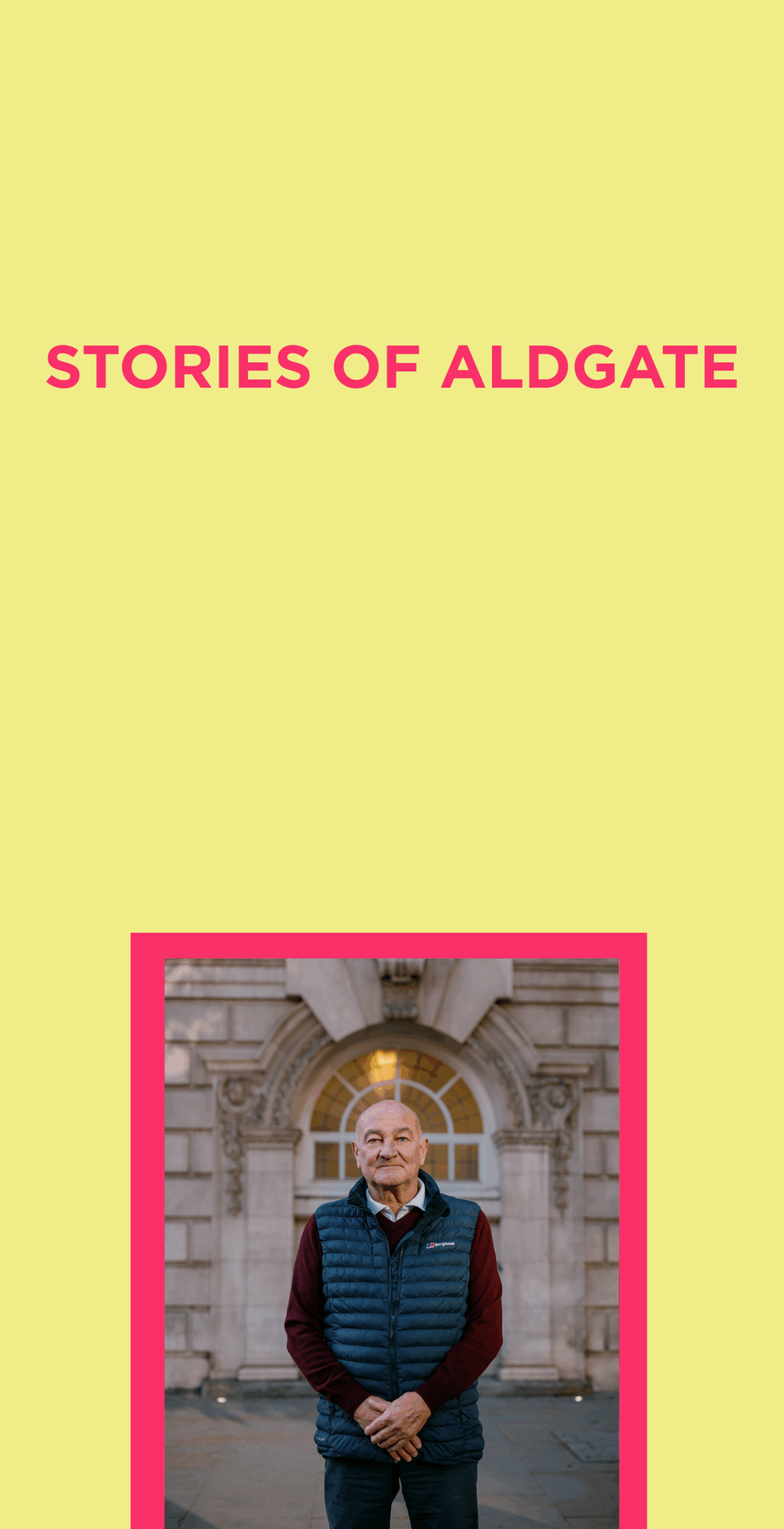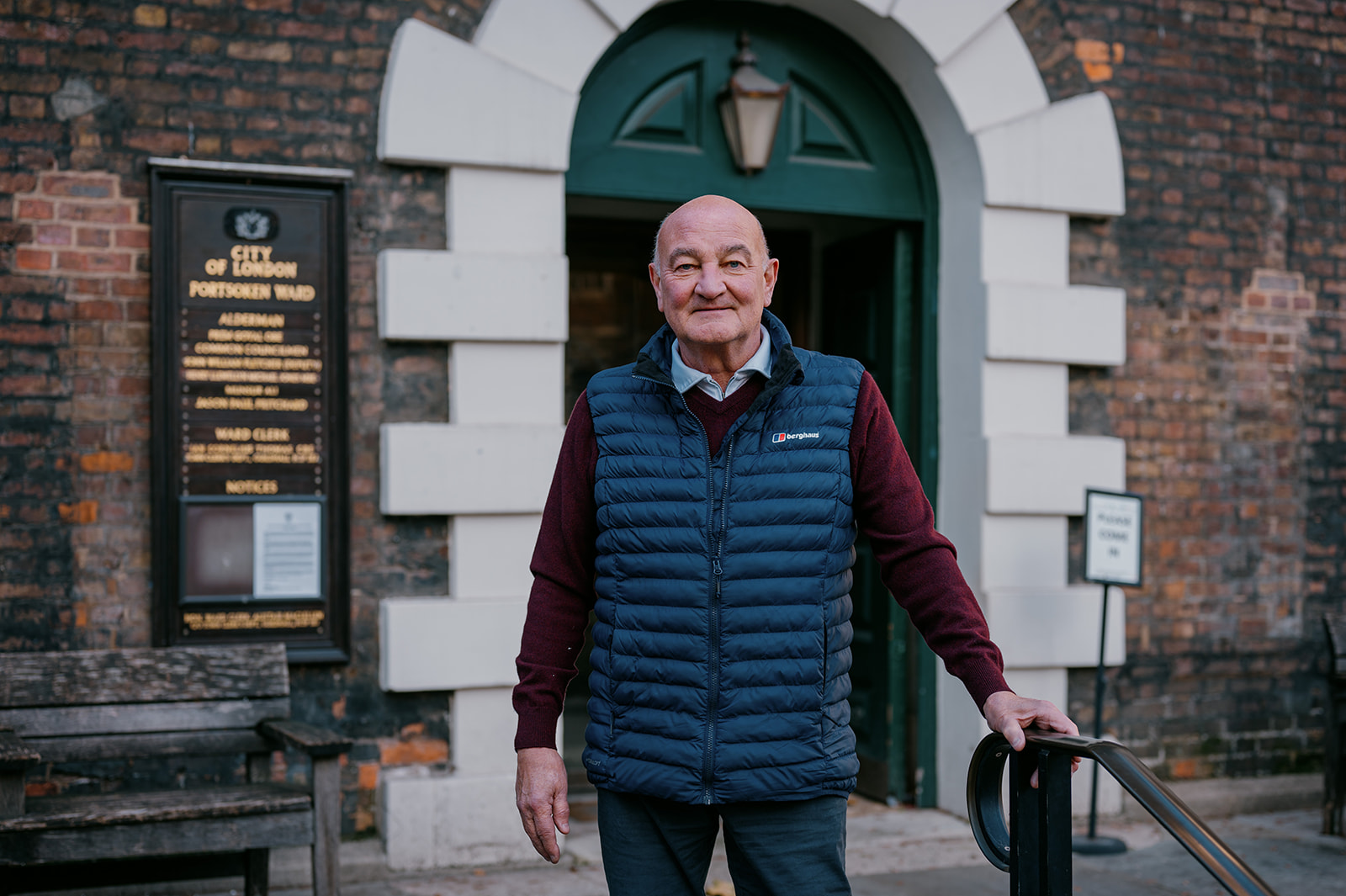Or you can read Henry’s story below:
I was born behind the shop in 53 Stoney Lane, 1955. And it was a very different time then. We had a room, a toilet, and a bedroom. And in that bedroom was my mum and dad, and me and my brother. It was one of them things.
We didn’t have much, but everybody was in the same boat. We all lived and we all played together. It was a big community, and having a business, we worked seven days a week. It was a tiny shop we had, but we ran milk rounds from that shop.
My grandfather started up in Jewry Street, brother was there before which is in Aldgate. Then moved into Artisan Dwellings in 1898, with my grandmother then. She left shares to all the family except one who already had her there in Leman Street. And my dad and his brother David. They bought the shares off the other siblings and started Jones Bros or Jones Brothers.
We had fridges in there and that, and it was a shop, but we did all the provisions, eggs, butter, cheese, bacon, tea, coffee. And then we had a sort of fresh counter where we did ham. My dad used to cook the hams and we’d, we’d do that in there. And it was busy because it was a predominantly Jewish area.
Saturdays there was nobody around really. And then, we had the Sunday trading with Petticoat Lane Market, which was going back to that time, it was a really thriving market. And it was one of the few places that had Sunday trading. The rest of the country didn’t have that. And we had the coaches come and park up in Aldgate from all across England and actually come down and buy things in Petticoat Lane Market.
We used to live behind the shop. And even when the shop was closed, there’d be people banging on the window and saying, “oh, can we have some milk? Can we have some sugar?” And we’d pass it out of our kitchen window to ’em. They might pay you. They might not. And it was like he was on call 24 hours a day.
The police used to come in, we’d deliver to the police stations and there’d be a knock on the door, the front door. We’ll let him in there. It’ll be a PC. They’ll come and have a cup of tea and sit there watching the tele in the wall. Next thing there’ll be another knock on the door and they’ll look out. It was a sergeant. So then the police officer went out the back door where the toilet is. ’cause you could get out onto the estate that way. Sergeant will be sitting down, he’ll be having his tea next week. It’d be another knock on the door. He’d be commander or the inspector. So he’d come in. So they all, they all sort of came in and had a cup of tea.
One moment I remember was the Moorgate train crash. It was a Sunday morning. I got a call from the City of London Police in Bishopsgate, said, could you take some refreshments down there to the station? Because they was working day and night down there, the police, the fire brigade. And it was, at the time, everything was all cut off at the gate into the Moorgate, down the stairs. ’cause none of the escalators were working. And I remember looking at it, you could see the train in the tunnel, smashed to pieces, what you could see of it. The police were down there, the fire brigade were down there and it was all sitting on the floor. But it was not like today. It was actually really smokey.
And I took 20 crates of milk down there. This is the bottles at the time, obviously we didn’t have cartons and that, and onto the platform and left it down there for refreshment while they were working. ’cause it was working 24/7. Sheer devastation down there. I just felt that I’m helping people. So it wasn’t nice to see. But we were asked to help out and we obviously did.
What I’ve learned about community is it’s nice to be involved. I run two seniors clubs now. I organize all the trips, the outings. We have Christmas dinner, sit down with an entertainer in the local Hilton Hotel. We do fish and chips in the local, in Goulston Street, at Happy Days.
If the people can’t actually attend. We do a takeaway service for them. It’s important because, when you see some people without having these things, don’t get the opportunity to go out.
Throughout the pandemic, we delivered to the city food bank, Golden Lane. We used to deliver fuel for the front line with the hospitals. We do a drop every week with produce we’ve got, and anything that’s short dated. We do smaller places, community hubs.
Through my work here, I got very friendly and involved with Lady Duro, who was the chairman of Guinness Trust. And she lived in Wellington House, One London. She personally gave 200,000 to the estate Guinness Trust, Ivy Court to have it secured properly because we was having trouble with drug addicts at the time.
When it was Guinness Trust 150th Anniversary, she invited me and it was at Clarence House, Prince Charles’ house.
So we’re there and it’s like a garden party as I’m there, one of the staff come over, “Henry, come here please.” And took me over. And right next to Antoinette Duro, the chairman, Prince Charles was coming. So she introduced me to Prince Charles. And she said he’s been a great help to us in, our estate in Aldgate. Really lovely. And that was a lovely evening. You’re in the house, you’re in the gardens, and it’s an honour to sort of look around.
Many years later, I receive the MBE for services to my community. We go to the palace on the long walk. You go through to different sort of rooms and you’re waiting. So then we get to the last room and Prince Charles is there. I get called up to Prince Charles and he says, oh, can you remind me why you’re receiving the MBE? So I said, well sir, it’s work in my community. And I said, say, I have met you before. And he sort of looked at me. He said, well, I don’t remember. And I said, well, I don’t expect you remember, but as we’re talking about, we’re going over things. He got into such a conversation with me and I said, sir, I’m sorry. He, I said, I think I should be going. He went, oh yes, Henry. He said, I, I was getting rather involved there with you, wasn’t I? And it was, it was a real lovely, lovely day.
Marvelous to receive the honour.




